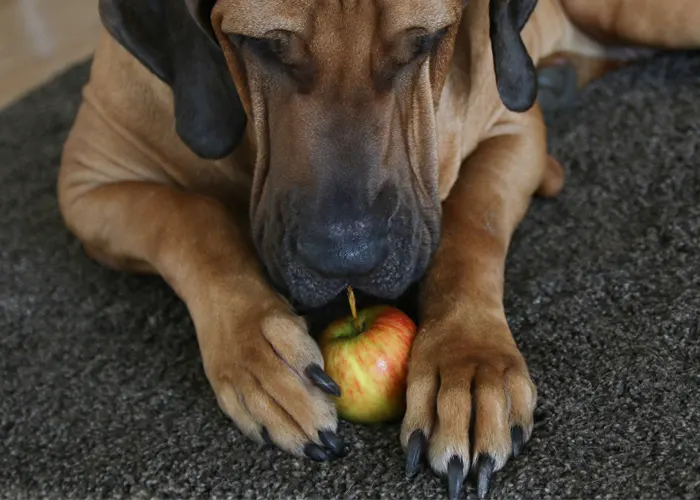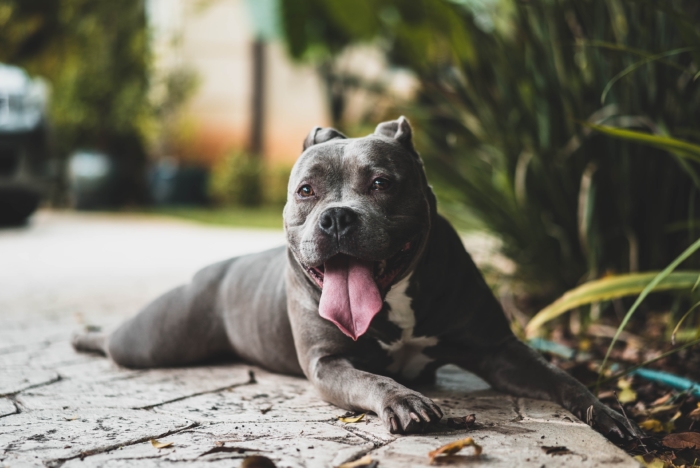Yes, dogs can eat apples and apple skins as they provide an excellent source of fiber for digestion, vitamins A and C, antioxidants, and calcium for healthy teeth and bones. Just make sure you remove the cores since they are choking hazards, and the seeds as they have tiny amounts of toxins (cyanide) in them, which you can read about here and here. It is also important to cut the apple into bite-sized pieces before feeding them to your four-legged friend so they don’t choke.
Hearing there is cyanide in a seed is scary, but don’t panic; you’ll find it in many types of fruits, including peaches. The amount is minimal, and this study from the NIH found it in smoothies and juices, which you’re likely already consuming without noticing. If you are concerned, talk to your own and your furbaby’s licensed medical professional to alleviate your fears. And don’t worry about apple trees in your yard or the neighbors; your dog is not in danger. Just keep an eye on them while they play and pick up any fallen apples.
You probably have questions about which types of apples are best for dogs, like Granny Smith or Fuji, and if eating apples is safe for puppies and senior pups. We’ve got you covered. Let’s start with the ingredients that will keep Rover roaming and playing.
The nutrients in apples healthy for dogs include:
- Antioxidants – work to fight cell damage.
- Calcium – helps keep teeth and bones strong.
- Fiber – aids your dog’s digestive system for more regularity.
- Phosphorus – just like calcium, this nutrient aids in healthy teeth and bones but also works towards a healthy metabolism.
- Vitamin A – perfect for puppies and dogs of all ages. The benefits are bone development, healthy eyesight, and an energy booster.
- Vitamin C – like a human, dogs can use an immunity boost, and vitamin C can help while improving the quality of their skin and coat.
- Vitamin K – for cardiovascular health and muscle function, vitamin K may assist your dog.
However, not everything in an apple is good for dogs as apples are high in sugar, so moderation is key. If your dog has diabetes or issues with sugar intake, talk to your pup’s vet before feeding any sugar-rich food like apples, strawberries, and pineapple.
If you’re curious about all of the nutrients in an apple, click here to view current stats from the USDA. The sugar levels change – but not drastically – with the different types of apples. Granny Smith, for example, has 9.59 grams of sugar, whereas Gala apples have 10.4 grams. It may seem like you should feed your dog green apples over red apples because of the lower amount of sugar, but taste comes into play here, too.
Green and yellow apples can taste more tart, and if your bestie has a sweet tooth, they may reject the apple pieces and not get the needed fiber and nutrients. That’s why red apples may be better; just make sure to feed them the correct amount based on size and age.

A general rule of thumb is 1 to 2 apple slices a day as a treat, or go for 10% of their total daily calorie count if you track that for your dog. Always talk to your vet if your dog has any special needs, and be careful with variations of apples.
Most organic applesauce are likely safe for dogs, but they probably contain added sugars, increasing the amount your best friend will consume. Dried apples have a crunch and different mouth feel that many dogs may find appealing. But avoid apple juice for your four-legged friend, as many brands add a lot of extra sugars, acids, and ingredients that are not friendly for fido.
Yes, dogs can eat apples and will likely love them. With everything in life, moderation is key. And make sure to cut them into small pieces and remove the core, as it is a choking hazard, and the seeds, as they have toxins. Did you find this food guide helpful? Submit your email below for more pet tips and advice.
Does your dog provide emotional support?
Work with a licensed professional to get a legit ESA letter in your state.





Leave a Comment